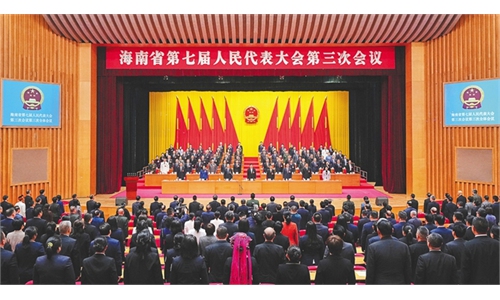
Photo:VCG
In the evolving landscape of international relations, the collaboration between the US and China in the realm of Artificial Intelligence (AI) technology, particularly with an emphasis on security concerns, emerges as a critical juncture that could significantly influence the stability of China-US ties.This issue gained prominence in November of last year when, during a landmark meeting in California, President Xi Jinping and President Joe Biden heralded the inception of new bilateral channels for consultation on AI.
This initiative was further highlighted in remarks by Arati Prabhakar, director of the White House Office of Science and Technology Policy and chief science advisor, who disclosed forthcoming plans for the US to engage with China on AI system security, as reported by the Financial Times.
The main challenge in this effort is the US' dualistic approach, which views the development of Chinese AI technology as a significant threat from its No.1 adversary. The US attempts to restrict high-tech access to China in this field while also working to establish a bilateral consultation mechanism.
The US has imposed export restrictions on high-end chips to China in order to control the transfer of technology and prevent the use of America's advanced GPU by Chinese technology companies.
Furthermore, the US has rallied its allies, notably those within the Five Eyes alliance, to establish a "small circle" for security purposes, exerting pressure on nations such as Saudi Arabia and the UAE to avoid deploying Huawei's 5G and AI technologies. These actions, ostensibly taken under the banner of national security, have transcended their stated purpose, disrupting the global economic and technological development landscape.
If AI technology is to be acknowledged as a crucial driver for the future global economy, the actions of the US go beyond just safeguarding technology and lean toward aiming to dominate the application market completely.
Using its technological and financial power and dominant position, the US presents security concerns as a convenient excuse to maximize profitability in global markets. It's a total zero-sum game principle.
The restriction on the export of AI technology and chips to China, ostensibly to prevent their deployment in military equipment — which is purported to augment the Chinese military's offensive capabilities — stands in stark contrast to the extensive use of this technology by the US in its military domain. This includes its utilization to underscore military superiority and simulate military conflicts in the Taiwan Straits, actions that serve to heighten tensions in China's periphery.
At the heart of the discourse on AI security lies a fundamental question: Whose security is truly at stake — humanity's or America's?
A clear delineation of this issue is paramount for advancing China-US discussions on AI security.
An initial step toward progress would involve both nations reaching a consensus on addressing the perils posed by AI applications, potentially setting the stage for negotiations concerning their use in attacks on nuclear command and control networks, given the global imperative for AI security management.
As a significant player in the AI technology arena and one of the fastest-growing in the global AI technology landscape, China's engagement in consultations with the US reflects a responsible stance. However, China is not merely a follower in the AI technological race; it presents a formidable challenge. The manner in which the US responds to the prospect of being outpaced in certain domains will be pivotal in approaching these consultations with the appropriate mindset.
If the US negotiates with China based on what is more conducive to maintaining its hegemonic position, such negotiations will not be successful.
The establishment of a collaborative and communicative framework between China and the US on AI technology, especially concerning security issues, is indispensable not only for the bilateral relationship but also for the global community at large. The success of such cooperation is contingent upon mutual respect, understanding and a collective commitment to ensuring the safety and security of AI applications.
This, in turn, will contribute to global stability and prosperity, heralding a new chapter in international cooperation on the frontier of AI technology.


